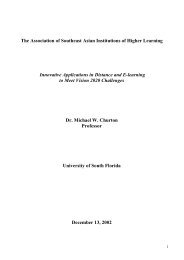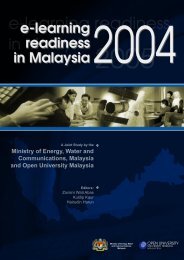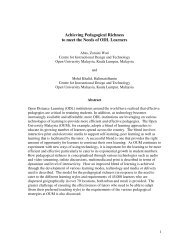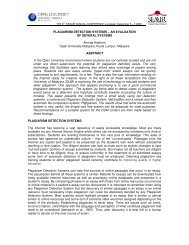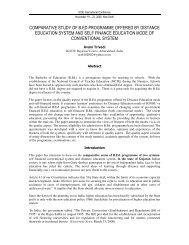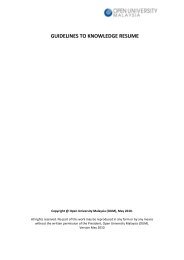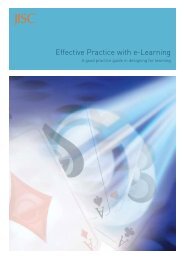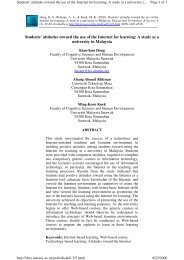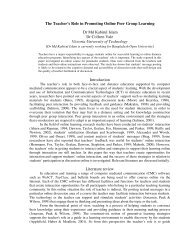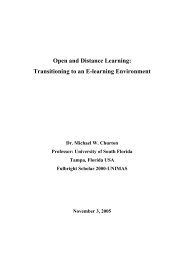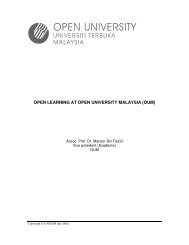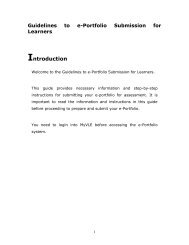• The company would provide the learner with a computer <strong>and</strong> Internet access for atleast two hours a day to enable him/her on the one h<strong>and</strong> to use ICTs on a daily basis<strong>and</strong>, on the other, to follow classes on the <strong>distance</strong> <strong>learning</strong> platform.• EBAD would teach the learner <strong>and</strong> find him/her a host establishment for the durationof the course.• Learners would pay a tuition fee of 240,000 CFA francs <strong>and</strong> work for their hostestablishment for the duration of the course.With respect to the face-to-face tuition, this arrangement would work to each party’sadvantage:• The company would have the services of an information worker for six monthswithout having to pay any extra wage costs or being under any obligation to hire theworker once the course was over.• EBAD would generate extra financial resources thanks to the tuition fees, <strong>and</strong> couldimprove the quality of training by strengthening the practical side.• Learners would have the chance to become acquainted with the realities of theworld of work for the duration of the course, to put what they learnt into practiceimmediately, <strong>and</strong>, ironically, to enjoy close <strong>and</strong> personalised supervision by tutorsvia communication tools (telephone, discussion forums, e-mail, etc.) <strong>and</strong> field visits.Of the 50 or so potential partners contacted, 19 establishments (public <strong>and</strong> privatecompanies, associations, schools, international organisations <strong>and</strong> state bodies) agreedto take part in the experiment. EBAD then proceeded to enrol 20 of the 30 prospectivelearners who had submitted an application form. 17The course began in December 2001 with the learners attending a ten-day group seminarat EBAD designed to brief them on the host establishment’s organisation <strong>and</strong> workingprocedures, to teach them the documentary techniques needed to become operationalas fast as possible; <strong>and</strong> to give them a grounding in ICTs so that they could use thosetechnologies as media for <strong>learning</strong> <strong>and</strong> communicating with EBAD tutors <strong>and</strong> as worktools for information resource management as soon as they were settled in at the hostestablishment.After the group seminar ended, the learners were despatched straight to their respectivehost establishments where they were able to continue the course <strong>and</strong> immediately putwhat they had learnt into practice. During this phase, beyond exchanges in the virtualclassroom, course tutors visited them in the field to check up on their <strong>learning</strong> conditions<strong>and</strong> what problems they were having.After four months in the field, the learners returned to EBAD for a mid-course groupsession. Among other things, this session served to take stock of progress <strong>and</strong> to teachtrainees the methodology they would need to draft a feasibility study to be presented tothe host establishment at the end of the course.Learner evaluation took place within the framework of examinations held in the EBADpremises, <strong>distance</strong> testing <strong>and</strong> a public dissertation presenting a documentary projecttogether with a course report, 18 the latter before a jury of EBAD tutors, representativesfrom the host establishment <strong>and</strong> teachers from the National Institute of DocumentationTechniques (Institut National des Techniques de la Documentation). 19 What was new atthis level was the inclusion on the jury of people from the world of work, which enabledthe dissertations to take professional concerns into account <strong>and</strong> to become more than justan academic exercise in style.56
In June 2002, when the course came to an end, 17 of the 20 learners originally enrolledwere awarded a business certificate as e-archivist/documentation specialists – an 85per cent success rate. This in itself was hardly unusual at EBAD, because both first<strong>and</strong> second-cycle success rates there generally came to over 90 per cent. While EBADgraduates have been known to go years without finding a job, however, 1,4 of the 17certificate holders emerging from this course were hired by the establishments where theyhad been placed for their training.Drawing on the success of this experiment, in June 2003 the Higher Institute ofCommunication, Business <strong>and</strong> Management (Institut Supérieur de la Communication,des Affaires et du Management) in Antananarivo, Madagascar, launched an informationmanagement certificate. The following October saw the start-up of a businessinformation <strong>and</strong> document management course at the Advanced School for the Science<strong>and</strong> Technology of Information <strong>and</strong> Communication (École Supérieure des Sciences etTechniques de l’Information et de la Communication) in Yaoundé, Cameroon. And theSchool of Information Sciences (Ecole des Sciences de l’Information) in Rabat, Morocco,decided to introduce four new certificate courses in information processing, archivemanagement, information technologies <strong>and</strong> information management. 20 Sadly, for wantnot just of the necessary human <strong>and</strong> financial resources, but also, <strong>and</strong> above all, of thecontacts needed to establish appropriate partnerships with the information science schoolsof English-speaking Africa, the reach of these courses is confined to the French-speakingworld. Ultimately, though, it would be interesting to set up a consortium to produce acombined French- <strong>and</strong> English-language course. With lessons delivered partly in French<strong>and</strong> partly in English, such a course could help foster mutual underst<strong>and</strong>ing if not fullfledgedbilingualism. Better still, graduates, no longer confined to a language zone, wouldhave greater mobility in Africa; course content would be improved through drawing on abroader pool of teachers; <strong>and</strong> the course itself would be economically stronger by beingable to target a wider market.CONCLUSIONThis kind of experience, combining a certificate course with work experience <strong>and</strong>the utilisation of ICTs, is relatively new to the French-speaking world <strong>and</strong> resemblesthe German block release system, known in French as the système dualiste (dualsystem). Demonstrating that continuing <strong>education</strong> <strong>and</strong> even initial training can be madecompatible with work, it amounts to an interesting means of putting the concept of<strong>lifelong</strong> <strong>learning</strong> into practice in that it helps combine training with work. This systemhas opened up new horizons for the many information workers for whom the future interms of their career <strong>and</strong> personal development prospects had previously seemed bleak.Without needing to stop work or leave their families for a long <strong>and</strong> costly stay abroad,they have been able to capitalise on a training course allowing them to close the graduallyexp<strong>and</strong>ing gulf between the skills acquired during their initial training <strong>and</strong> the new needsemerging over time on account of the changes in their socio-professional environment.The use of <strong>distance</strong> <strong>learning</strong> has therefore enabled those taking part to strike a balancebetween the dem<strong>and</strong>s of their working lives, private lives <strong>and</strong> training, which is seldompossible within the conventional systems that often require one of those three elementsto be sacrificed. Furthermore, the fact that this course calls for a fairly intensive use ofICTs ultimately helps prepare them better to meet the new dem<strong>and</strong>s of their professionalenvironment <strong>and</strong> enables them to use those technologies to continually renew theirknowledge by tapping into the resources available online. Finally, for those on initialtraining courses, the combination of business immersion <strong>and</strong> <strong>distance</strong> training has helpedfoster a better balance between training <strong>and</strong> work, <strong>and</strong> has enabled them to quickly57
- Page 1 and 2:
PERSPECTIVES ONDISTANCE EDUCATIONLi
- Page 3 and 4:
The Commonwealth of Learning (COL)
- Page 5 and 6:
ACKNOWLEDGEMENTSIn addition to the
- Page 7 and 8:
These are some of the issues that a
- Page 9 and 10:
What are the trends and issues in l
- Page 11 and 12:
of policy implications relating to
- Page 13 and 14: evince important differences that c
- Page 15 and 16: inequitable regulations governing t
- Page 17 and 18: associations and groups of countrie
- Page 19 and 20: THE CONTRIBUTORChristopher McIntosh
- Page 21 and 22: INTRODUCTIONIn his 1996 report to U
- Page 23 and 24: Lastly, our analysis of the situati
- Page 25 and 26: diploma or similar certificates of
- Page 27 and 28: force of the undertaking. Here agai
- Page 29 and 30: RELEVANT INTERNET SITESUNESCO Task
- Page 31 and 32: Notes1. This phrasing has been used
- Page 33 and 34: goals (Daniel, 1996). Lifelong lear
- Page 35 and 36: eported that group activity had red
- Page 37 and 38: NEW AREAS FOR DISTANCE EDUCATION:WO
- Page 39 and 40: targets systematically for the use
- Page 41 and 42: Rausch, A.S. (2003). A case study o
- Page 43 and 44: correspondence teaching systems tha
- Page 45 and 46: significant differences between syn
- Page 47 and 48: In distance flexible- and blended-e
- Page 49 and 50: STATE-FUNDED DUAL-MODE SYSTEMS ATUN
- Page 51 and 52: Table 4.2: Fundable elements in dis
- Page 53 and 54: sciences in 21 countries of the reg
- Page 55 and 56: How a system is funded depends in p
- Page 57 and 58: Litto, Fredric M. (2004). Digital l
- Page 59 and 60: CHAPTER 5LIFELONG LEARNING IN THE A
- Page 61 and 62: education, which was initiated by C
- Page 63: So the virtual classroom acted as a
- Page 67 and 68: RELEVANT INTERNET SITESFORCIIR proj
- Page 69 and 70: 11. The approximate rate for 1€ w
- Page 71 and 72: The term modern distance education
- Page 73 and 74: the National Networked Consortium f
- Page 75 and 76: important resource for undeveloped
- Page 77 and 78: standards have been proposed for th
- Page 79 and 80: The development of e-learning withi
- Page 81 and 82: RELEVANT INTERNET SITESCCRTVU Onlin
- Page 83 and 84: MoE (2004b) The Notice on Running N
- Page 85 and 86: CHAPTER 7QUALITY ASSURANCE SURVEYOF
- Page 87 and 88: (Paris, France, 28-29 June 2004) in
- Page 89 and 90: Examples of elaborated QA policies:
- Page 91 and 92: plans and produces its conventional
- Page 93 and 94: SHTVU (China)• Teaching• Teachi
- Page 95 and 96: offers its programmes to Turkish ci
- Page 97 and 98: mega universities apply a set of st
- Page 99 and 100: RELEVANT INTERNET SITESThe Commonwe
- Page 101 and 102: 2. QA initiatives or publications b
- Page 103 and 104: assurance of ODL. This DST will be
- Page 105 and 106: Educational Planning has been respo
- Page 107 and 108: A system of weighting of the key qu
- Page 109 and 110: RELEVANT INTERNET SITESHigher Educa
- Page 111 and 112: CHAPTER 9THE FINNISH VIRTUAL UNIVER
- Page 113 and 114: foreign providers. In Finland, the
- Page 115 and 116:
to make the best use of new educati
- Page 117 and 118:
The foremost task for the Service U
- Page 119 and 120:
part of quality management. The aim
- Page 121 and 122:
online courses; an educational tech
- Page 123 and 124:
polytechnics, research institutions
- Page 125 and 126:
CHAPTER 10PROMOTING CROSS-BORDERREC
- Page 127 and 128:
The Bologna Declaration was followe
- Page 129 and 130:
indicators currently being used for
- Page 131 and 132:
the qualification resulting from th
- Page 133 and 134:
Table 9.1: Outline of the portfolio
- Page 135 and 136:
• Make sure that incoming student
- Page 137 and 138:
CHAPTER 11CHARTING THE EVOLUTIONOF
- Page 139 and 140:
Another common characteristic was t
- Page 141 and 142:
the current capacity of the educati
- Page 143 and 144:
conditions for success. Conditions
- Page 145 and 146:
Cultural and ethical issues in inte
- Page 147 and 148:
the cost and maintenance of learnin
- Page 149 and 150:
Research can be a useful tool for c
- Page 151 and 152:
REFERENCESBates, A. (1995). Technol
- Page 153 and 154:
Twigg, C. (2001). Quality Assurance
- Page 155 and 156:
y, for example, entering into partn
- Page 157 and 158:
and even greater steps, and the dec



